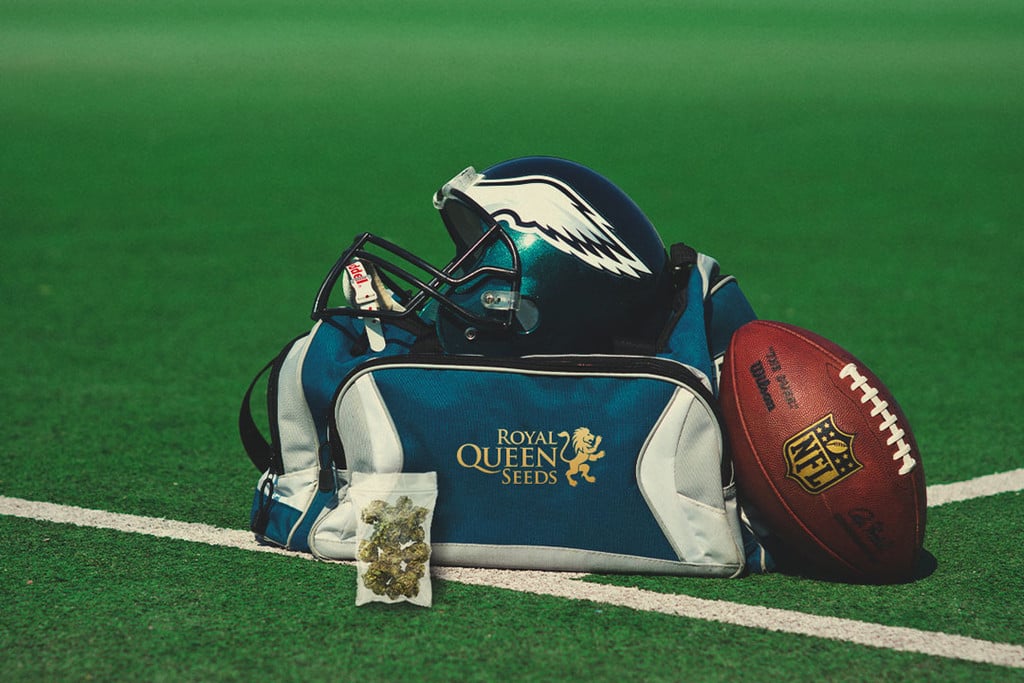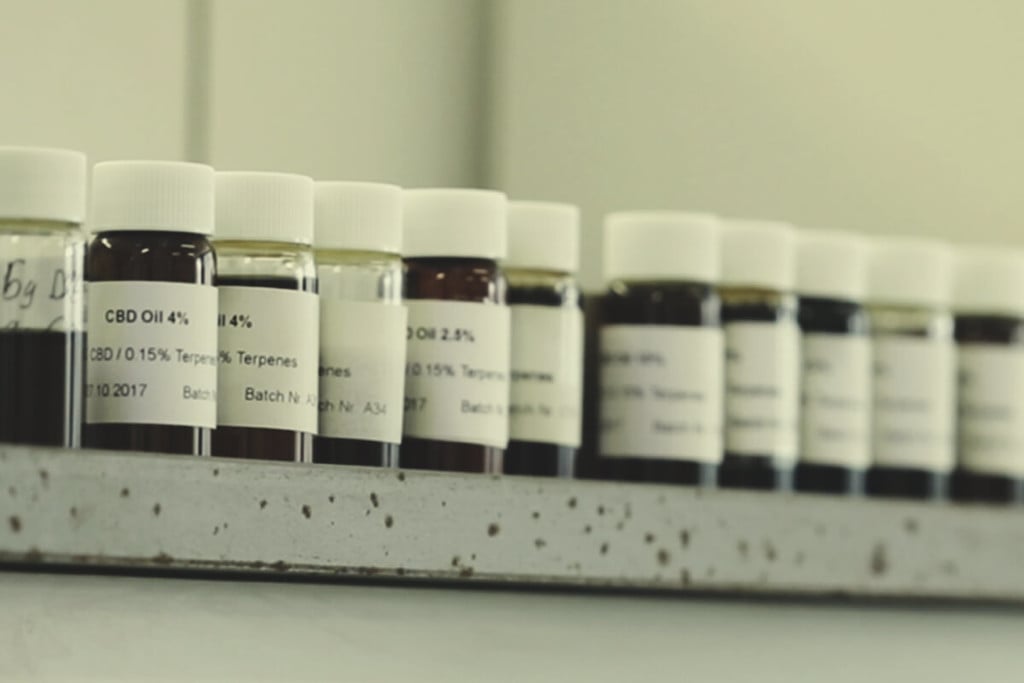.

Medical Marijuana in the NFL: Research & Benefits to Players
Cannabis activists from all walks of life have long opposed federal cannabis prohibition. Now, big names, including the NFL, are coming into the fold. In a search for safer therapeutics for athletes, the NFL plans to donate an impressive $1 million to researchers in order to see what it can offer players.
Contents:
As the current trend of cannabis legalization continues, major sports leagues and championships are weighing in on the use of the plant in football (NFL), basketball (NBA), mixed martial arts (MMA), and hockey (NHL). The National Football League (NFL) in the US made it clear where they stand on the issue on June 8th, 2021. A commission formed between the league and the Players Association announced its plans to award up to $1 million in grants for researchers to explore the therapeutic effects of cannabis.
Cannabis legalization in the US remains blurry and confusing. Although nineteen states have legalized cannabis for adult use, the plant remains illegal at the federal level. The Drug Enforcement Agency (DEA) classes cannabis as a Schedule 1 substance. By definition, this means the plant has no accepted medical use and a high potential for abuse.
The Hurdles to Quality Cannabis Research in the US
Every time an NFL player, or any other athlete, decides to take cannabis, they’re technically committing a federal crime. But research from around the world contradicts the DEA’s categorisation of the plant. The discovery of the endocannabinoid system, a slew of promising ongoing studies, and the inherent safety of the herb compared to other substances poke serious holes in the agency's logic.
Currently, federal law pitches a curveball at scientists looking to study the effects on the plant. Once they obtain a licence from the DEA and Food and Drug Administration (FDA), researchers are limited to poor-quality cannabis samples[1] grown at the University of Mississippi, which don’t reflect the flowers available in the medical and recreational markets. Historically, most research has set out to prove the dangers of cannabis, not its potential benefits.
This massive research donation from the NFL and Players Association hopes to place the ball in the federal government’s court, so to speak. The commission definitely has an agenda tied to their grants. The league has become much more accepting of cannabis in the last few years and recognises the benefits it can bring to players. But doesn't the NFL test for weed? Well, the league struck a collective bargaining agreement in 2020 that changed the NFL weed policy and resulted in more lenient drug testing. The league stated it won’t test players for cannabis[2] during the offseason.
Cannabis could also serve as an important tool for current and retired NFL athletes, and we’re not talking about merely getting stoned here. Ongoing studies are exploring the anti-inflammatory and pain-killing potential of the herb, whereas others are eyeing up cannabis as a potential treatment for traumatic brain injury—a condition that plagues retired players.
Stoking the flames of fruitful cannabis research essentially puts pressure on the DEA and federal government. Not only does it drive a more thorough understanding of the plant, but it helps to change public perception when such a large and respected organisation sides with medical cannabis. With this donation, the NFL joins the ranks of giants such as Amazon and several investment banks to lobby the government to change its stance on cannabis. As many of us are aware, money usually makes things move quicker.


Could Cannabis Help NFL Players Bear the Brunt of Injuries?
But what can the NFL truly gain from pouring big bucks into cannabis research? Well, this area of study could theoretically open up an avenue of therapeutics to maintain the quality of life of players, both at the height of their careers and into retirement and old age.
Pain
Imagine spending your entire career running full-speed into athletic men. Sure, NFL athletes train their bodies to handle this load, but the muscles, tendons, ligaments, and bones can only adapt to a certain degree. Constant impact over time takes a big toll on the body. While players might not experience constant pain until later in their career, retired NFL athletes take painkillers at four times the rate of the general population.
Unfortunately, addiction-forming opioids are often the first port of call. A study conducted at Washington University surveyed 644 players who retired from the league between 1979 and 2008. The research found that 52% of the players used opioids, and 71% of them met the criteria for abuse[3].
But opioids aren’t the only molecules suitable for treating pain. Ongoing studies are exploring the role of cannabis in taking the edge off chronic aches, throbbing, and discomfort.
The plant contains over 500 molecules of interest, and over 100 of these are categorised as cannabinoids. These chemicals bind to specialised receptors throughout our bodies that (largely) belong to the endocannabinoid system (ECS). This network regulates a wide range of physiological processes, including pain modulation.
Let’s take THC, for example. This psychotropic cannabinoid binds to a receptor called CB1, found predominantly throughout the nervous system. This site modulates pain regulation[4] and occurs throughout areas of the CNS that control pain signalling. Cannabis researchers are exploring the role of THC and other cannabinoids in relation to various forms of chronic pain[5], including neuropathic and inflammatory pain.
But cannabinoids aren’t the only compounds in cannabis that pain researchers are studying. Scientists are currently investigating the aromatic terpene molecules humulene, geraniol, linalool, and pinene for their pain-killing potential[6].
Traumatic Brain Injury
NFL players don’t just take a constant impact on the body. They also experience frequent blunt force trauma to the head. Findings suggest that the vast majority of NFL players develop a progressive brain condition known as chronic traumatic encephalopathy (CTE) as a result of repeated blows to the head and bouts of concussion.
Also known as “punch drunk” syndrome in boxers, the condition involves the shrinking of the brain and the presence of misfolded proteins that cause cells to malfunction. The symptoms of CTE include:
| Short-term memory loss | Changes in mood | Confusion and disorientation | Thinking difficulties | Slurred speech | Parkinsonism |
| Short-term memory loss | Changes in mood |
| Confusion and disorientation | Thinking difficulties |
| Slurred speech | Parkinsonism |
Despite the seriousness of this condition, medical professionals find it difficult to diagnose, as routine brain scans often fail to detect the signs. Therefore, the condition mostly shows up postmortem. A study published in the Journal of the American Medical Association analised the brains[7] of 111 deceased former NFL players, and 110 of them were found to have CTE—a dire prognosis for living players.
Now, researchers are probing cannabis in search of therapeutics for the condition, and a former NFL star has stepped up to the mark to foot the bill. Calvin Johnson, who famously played for the Detroit Lions, is donating a six-figure sum[8] to his own company Primitive. He hopes his funding will put his medical cannabis business in the position to develop a treatment for CTE.
Fracture
Running full-speed into another person increases the odds of a fracture. Who’d have guessed? These collisions can cause breaks in bones all over the body, from the foot and hand to the spine. Players that experience a fracture undergo the routine treatment of a cast and a bout of physiotherapy.
Remember when we mentioned cannabinoid receptors show up all over the body? Well, some of them reside in the membrane of bone cells. Our bones are in a constant state of remodelling. Cells called osteoblasts lay down new tissues, whereas osteoclasts strip away old bone. Nutrition, exercise, and the ECS play an important role in maintaining this balance, and disruptions can lead to conditions such as osteoporosis (a decline in bone density).
The presence of the ECS in the skeleton means cannabinoids can modulate this system. For example, CB2 receptors are expressed in both osteoblasts and osteoclasts, and stimulate bone formation[9]. Researchers are exploring if cannabinoids could play a role in fracture healing through this mechanism.
Scientists from Tel Aviv in Israel are exploring the effects of CBD (cannabidiol) on mid-femoral (the large bone that spans from the hip to the knee) fractures in rats. So far, they’ve tested the non-psychotropic cannabinoid on these breaks over eight weeks[10].


But researchers aren’t stopping at CBD. There are over 100 phytocannabinoids in weed, after all. They’re also exploring CBG (cannabigerol) for possible bone-healing properties[11]. Known as the mother cannabinoid, this molecule serves as the precursor to THCA and CBDA (when in the form of CBGA).
Are there any more fracture-healing candidates in the trichomes of cannabis flowers? It appears possible. Scientists are exploring the terpene beta-caryophyllene in the area of bone remodelling. This molecule occurs as one of the most prominent terpenes in cannabis, as well as other herbs and spices such as lemon balm, clover, and rosemary. Beta-caryophyllene also works as a cannabinoid, as it directly binds to CB2 receptors, making it an interesting candidate[12] for post-fracture bone remodelling.
Osteoarthritis
Osteoarthritis (OA) involves the degeneration of joint cartilage. The constant impact experienced by NFL athletes causes wear and tear in this connective tissue and eventually starts to affect the underlying bone. Previous knee injuries also increase the risk of developing OA, and NFL players experience frequent tears in the ligaments that keep the knee joint stable. This means they’re especially prone to early-onset OA[13].
So, where does cannabis come in? Well, researchers have identified ECS components in synovial tissue—membranes that surround the joints. Studies are now moving ahead to explore the role of cannabinoids[14] specifically on OA joint pain and inflammation.
Recovery
NFL players, and most athletes for that matter, put their bodies through their paces almost every day. From conditioning and strength training to competing, players walk the fine line between adequate recovery and career-ending injury. As the movers of the body, the muscles take a particularly brutal blow—hence why you often see top-tier athletes plunge into ice baths and walk into cryogenic chambers as part of their recovery programme.
Now, researchers are looking into CBD as a means of augmenting athletic recovery strategies. Scientists are exploring the effects of the cannabinoid when it comes to muscle soreness and recovery[15].
Anxiety
Can you imagine performing in a high-stakes game in front of millions of people, where one mistake could cost your team the match and leave your reputation in tatters? Of course, NFL players have access to some of the best sports psychologists in the world to help them work through any anxiety or unease. But CBD might also help them overcome excess worrying and get their head in the game. Researchers are exploring the role of CBD in reducing anxiety during high-pressure situations[16]. Could we soon see NFL players popping CBD capsules before a match to ease their nerves?
The Future of Medical Cannabis in American Football
It's hard to deny that some sort of change is likely to occur in the NFL's weed policy—and probably in the near future. As other sports authorities are easing restrictions, American football's biggest force has little reason not to follow suit, especially given the plant's potential benefits for the many short and long-term injuries caused by the sport.
- Cannabis research stalled by federal inaction https://cen.acs.org
- NFL Players Can Smoke Marijuana Without Discipline Starting 4/20 https://www.insider.com
- Retired NFL players using painkillers – Washington University School of Medicine in St. Louis https://medicine.wustl.edu
- Cannabinoids and Pain: New Insights From Old Molecules https://www.ncbi.nlm.nih.gov
- Frontiers | Cannabinoids and Pain: New Insights From Old Molecules | Pharmacology https://www.frontiersin.org
- Cannabis sativa terpenes are cannabimimetic and selectively enhance cannabinoid activity | Scientific Reports https://www.nature.com
- High Prevalence of Evidence of CTE in Brains of Deceased Football Players - For The Media - JAMA Network https://media.jamanetwork.com
- Can Marijuana Help Treat CTE? Former NFL Star Partners With Harvard To Find Out https://www.greenentrepreneur.com
- Cannabinoids and the skeleton: from marijuana to reversal of bone loss - PubMed https://pubmed.ncbi.nlm.nih.gov
- Cannabidiol, a Major Non-Psychotropic Cannabis Constituent Enhances Fracture Healing and Stimulates Lysyl Hydroxylase Activity in Osteoblasts https://asbmr.onlinelibrary.wiley.com
- Chapter 99 - Potential Medical Uses of Cannabigerol: A Brief Overview https://www.sciencedirect.com
- β-Caryophyllene promotes osteoblastic mineralization, and suppresses osteoclastogenesis and adipogenesis in mouse bone marrow cultures in vitro https://www.ncbi.nlm.nih.gov
- Early-onset arthritis in retired National Football League players - PubMed https://pubmed.ncbi.nlm.nih.gov
- Cannabis and joints: scientific evidence for the alleviation of osteoarthritis pain by cannabinoids https://www.sciencedirect.com
- Cannabidiol and Sports Performance: a Narrative Review of Relevant Evidence and Recommendations for Future Research https://www.ncbi.nlm.nih.gov
- Cannabidiol Reduces the Anxiety Induced by Simulated Public Speaking in Treatment-Naïve Social Phobia Patients https://www.ncbi.nlm.nih.gov





































